SEARCH BY TITLE
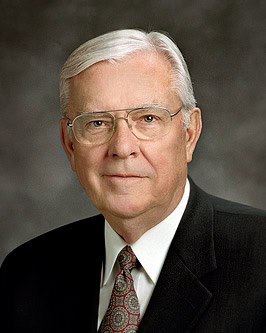 Doctrine of Inclusion
Doctrine of Inclusion
Then Jesus delivered His final instruction to the lawyer—and to all who have read the parable of the good Samaritan: “Go, and do thou likewise”. Every time I read this parable I am impressed with its power and its simplicity. But have you ever wondered why the Savior chose to make the hero of this story a Samaritan? There was considerable antipathy between the Jews and the Samaritans at the time of Christ. Under normal circumstances, these two groups avoided association with each other. It would still be a good, instructive parable if the man who fell among thieves had been rescued by a brother Jew. His deliberate use of Jews and Samaritans clearly teaches that we are all neighbors and that we should love, esteem, respect, and serve one another despite our deepest differences—including religious, political, and cultural differences. That instruction continues today to be part of the teachings of The Church of Jesus Christ of Latter-day Saints. In enumerating the key doctrines of the restored Church, Joseph Smith said, while “we claim the privilege of worshiping Almighty God according to the dictates of our own conscience,” we also “allow all men the same privilege, let them worship how, where, or what they may”. Thankfully, many of our members understand this doctrine and live it during the course of their daily lives. I recently read a news account of a tragic death in a community here in Utah. A grieving young widow was quoted: “We’ve been overwhelmed by support. We’re not Mormon, but the local ward here has been all over us with meals and help and words of comfort. It’s been a total outpouring of love, and we appreciate it”. That’s just as it should be. If we are truly disciples of the Lord Jesus Christ, we will reach out with love and understanding to all of our neighbors at all times, particularly in times of need.
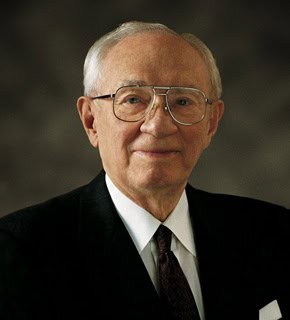 Forgiveness
Forgiveness
I wish today to speak of forgiveness. I think it may be the greatest virtue on earth, and certainly the most needed. There is so much of meanness and abuse, of intolerance and hatred. There is so great a need for repentance and forgiveness. It is the great principle emphasized in all of scripture, both ancient and modern. In all of our sacred scripture, there is no more beautiful story of forgiveness than that of the prodigal son found in the 15th chapter of Luke. Everyone should read and ponder it occasionally. “And when [the prodigal] had spent all, there arose a mighty famine in that land; and he began to be in want. “And he went and joined himself to a citizen of that country; and he sent him into his fields to feed swine. “And he would fain have filled his belly with the husks that the swine did eat: and no man gave unto him. “And when he came to himself, he said, How many hired servants of my father’s have bread enough and to spare, and I perish with hunger! “I will arise and go to my father, and will say unto him, Father, I have sinned against heaven, and before thee, “And am no more worthy to be called thy son: make me as one of thy hired servants. “And he arose, and came to his father. But when he was yet a great way off, his father saw him, and had compassion, and ran, and fell on his neck, and kissed him. “And the son said unto him, Father, I have sinned against heaven, and in thy sight, and am no more worthy to be called thy son”. And the father caused that a great feast should be held, and when his other son complained, he said to him, “It was meet that we should make merry, and be glad: for this thy brother was dead, and is alive again; and was lost, and is found”. When there has been wrongdoing and then there has come repentance, followed by forgiveness, then literally the offender who was lost is found, and he who was dead is made alive. How wonderful are the blessings of mercy and forgiveness.
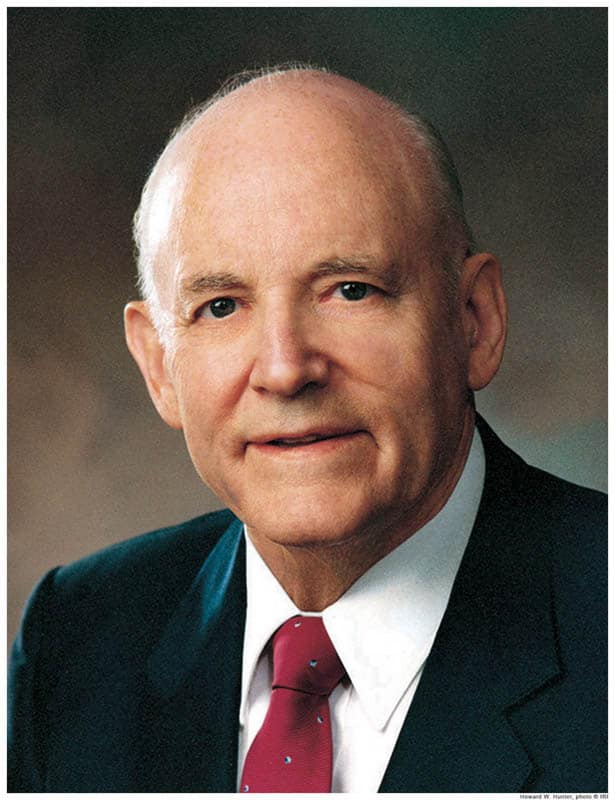 The God That Doest Wonders
The God That Doest Wonders
Consider this simple but telling account from the Savior’s ministry to make manifest the works of God in men’s lives. One Sabbath day Jesus anointed the eyes of a man blind from birth, and the man’s eyesight was restored. It was a startling and inspiring manifestation. Unfortunately, however, some who learned of it would not rejoice that one of the local citizens had his vision returned. “Therefore said some of the Pharisees, This man [meaning Jesus] is not of God, because he keepeth not the sabbath day. Others said, How can a man that is a sinner do such miracles? And there was a division among them,” the scripture tells us. With such a controversy inside their ranks, this group did a very intelligent thing—they asked the opinion of the man who had been healed. “What sayest thou of him, that … hath opened thine eyes?” they asked, and waited for his answer. As he spoke, the blind man undoubtedly looked directly into their eyes (a new and precious privilege). He said plainly, “He is a prophet.” But that was an unsettling answer. After much discussion, including conversation with the man’s parents, the Pharisees agreed to acknowledge that there had indeed been a miracle and that it might have come from God, but that this man must deny any role Christ may have played in the process: “Then again called they the man that was blind, and said unto him, Give God the praise: we know that this man [Jesus] is a sinner.” Unencumbered by theory or law, the man said, slowly enough for everyone to hear, “Whether [Jesus] be a sinner or no, I know not: [just] one thing I know, that, whereas I was blind, now I see.” The Pharisees, in total frustration and unable to argue with that single greatest and undeniable fact in the case, cast the man out of their presence. Then comes this sweet conclusion to a story about renewed sight and brighter light: “Jesus heard that they had cast him out; and when he had found him, he said unto him, Dost thou believe on the Son of God? “He answered and said, Who is he, Lord, that I might believe on him? “And Jesus said unto him, Thou hast both seen him, and it is he that talketh with thee. “And he said, Lord, I believe. And he worshipped him.” Now sight had been given twice—once to remedy a congenital defect and once to behold the King of Kings before He would ascend to His eternal throne. Jesus had quickened both temporal and spiritual vision. He had cast his light into a dark place, and this man, like many others in that day as well as in our own, had accepted the light and had seen. President Spencer W. Kimball taught us with a book by the title Faith Precedes the Miracle. But there is, of course, an increase of faith that should follow the miracle as well. As a result of the many miracles in our lives, we should be more humble and more grateful, more kind and more believing. When we are personal witnesses to these wonders which God performs, it should increase our respect and love for him; it should improve the way we behave. We will live better and love more if we will remember that. We are miracles in our own right, every one of us, and the resurrected Son of God is the greatest miracle of all. He is, indeed, the miracle of miracles, and every day of his life he gave evidence of it. We should try to follow after him in that example.
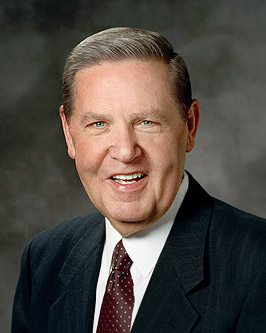 “Lord, I Believe”
“Lord, I Believe”
On one occasion Jesus came upon a group arguing vehemently with His disciples. When the Savior inquired as to the cause of this contention, the father of an afflicted child stepped forward, saying he had approached Jesus’s disciples for a blessing for his son, but they were not able to provide it. With the boy still gnashing his teeth, foaming from the mouth, and thrashing on the ground in front of them, the father appealed to Jesus with what must have been last-resort desperation in his voice: “If thou canst do any thing,” he said, “have compassion on us, and help us. “Jesus said unto him, If thou canst believe, all things are possible to him that believeth. “And straightway the father of the child cried out, and said with tears, Lord, I believe; help thou mine unbelief.” This man’s initial conviction, by his own admission, is limited. But he has an urgent, emphatic desire in behalf of his only child. We are told that is good enough for a beginning. “Even if ye can no more than desire to believe,” Alma declares, “let this desire work in you, even until ye believe.”2 With no other hope remaining, this father asserts what faith he has and pleads with the Savior of the world, “If thou canst do any thing, have compassion on us, and help us.”3 I can hardly read those words without weeping. The plural pronoun us is obviously used intentionally. This man is saying, in effect, “Our whole family is pleading. Our struggle never ceases. We are exhausted. Our son falls into the water. He falls into the fire. He is continually in danger, and we are continually afraid. We don’t know where else to turn. Can you help us? We will be grateful for anything—a partial blessing, a glimmer of hope, some small lifting of the burden carried by this boy’s mother every day of her life.” “If thou canst do any thing,” spoken by the father, comes back to him “If thou canst believe,” spoken by the Master. “Straightway,” the scripture says—not slowly nor skeptically nor cynically but “straightway”—the father cries out in his unvarnished parental pain, “Lord, I believe; help thou mine unbelief.” In response to new and still partial faith, Jesus heals the boy, almost literally raising him from the dead, as Mark describes the incident. With this tender scriptural record as a backdrop, I wish to speak directly to the young people of the Church—young in years of age or young in years of membership or young in years of faith. One way or another, that should include just about all of us.
 The Other Prodigal
The Other Prodigal
Among the most memorable parables the Savior ever told is the story of a foolish younger brother who went to his father, asked for his portion of the estate, and left home to squander his inheritance, the scripture says, in “riotous living.” His money and his friends disappeared sooner than he thought possible—they always do—and a day of terrible reckoning came thereafter—it always does. . . But being caught up in this younger son’s story, we can miss, if we are not careful, the account of an elder son, for the opening line of the Savior’s account reads, “A certain man had two sons”—and He might have added, “both of whom were lost and both of whom needed to come home.” The younger son has returned, a robe has been placed on his shoulders and a ring on his finger, when the older son comes on the scene. . . Certainly this younger brother had been a prisoner—a prisoner of sin, stupidity, and a pigsty. But the older brother lives in some confinement, too. He has, as yet, been unable to break out of the prison of himself. He is haunted by the green-eyed monster of jealousy. He feels taken for granted by his father and disenfranchised by his brother, when neither is the case. He has fallen victim to a fictional affront. . . How does this happen, especially when we wish so much that it would not? I think one of the reasons is that every day we see allurements of one kind or another that tell us what we have is not enough. Someone or something is forever telling us we need to be more handsome or more wealthy, more applauded or more admired than we see ourselves as being. We are told we haven’t collected enough possessions or gone to enough fun places. We are bombarded with the message that on the world’s scale of things we have been weighed in the balance and found wanting. Some days it is as if we have been locked in a cubicle of a great and spacious building where the only thing on the TV is a never-ending soap opera entitled Vain Imaginations. But God does not work this way. The father in this story does not tantalize his children. He does not mercilessly measure them against their neighbors. He doesn’t even compare them with each other. His gestures of compassion toward one do not require a withdrawal or denial of love for the other. He is divinely generous to both of these sons. Toward both of his children he extends charity. I believe God is with us the way my precious wife, Pat, is with my singing. She is a gifted musician, something of a musical genius, but I couldn’t capture a musical note with Velcro. And yet I know she loves me in a very special way when I try to sing. I know that because I can see it in her eyes. They are the eyes of love.
 “Remember Lot’s Wife”
“Remember Lot’s Wife”
Let’s recall who Lot’s wife was. The original story, of course, comes to us out of the days of Sodom and Gomorrah, when the Lord, having had as much as He could stand of the worst that men and women could do, told Lot and his family to flee because those cities were about to be destroyed. . . In the time we have this morning, I am not going to talk to you about the sins of Sodom and Gomorrah, nor of the comparison the Lord Himself has made to those days and our own time. I am not even going to talk about obedience and disobedience. I just want to talk to you for a few minutes about looking back and looking ahead. . . Apparently what was wrong with Lot’s wife was that she wasn’t just looking back; in her heart she wanted to go back. It would appear that even before they were past the city limits, she was already missing what Sodom and Gomorrah had offered her. As Elder Maxwell once said, such people know they should have their primary residence in Zion, but they still hope to keep a summer cottage in Babylon. It is possible that Lot’s wife looked back with resentment toward the Lord for what He was asking her to leave behind. We certainly know that Laman and Lemuel were resentful when Lehi and his family were commanded to leave Jerusalem. So it isn’t just that she looked back; she looked back longingly. In short, her attachment to the past outweighed her confidence in the future. That, apparently, was at least part of her sin. So, as a new year starts and we try to benefit from a proper view of what has gone before, I plead with you not to dwell on days now gone, nor to yearn vainly for yesterdays, however good those yesterdays may have been. The past is to be learned from but not lived in. We look back to claim the embers from glowing experiences but not the ashes. And when we have learned what we need to learn and have brought with us the best that we have experienced, then we look ahead, we remember that faith is always pointed toward the future. Faith always has to do with blessings and truths and events that will yet be efficacious in our lives. So a more theological way to talk about Lot’s wife is to say that she did not have faith. She doubted the Lord’s ability to give her something better than she already had. Apparently she thought—fatally, as it turned out—that nothing that lay ahead could possibly be as good as those moments she was leaving behind.
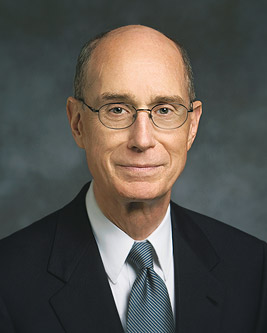 That We May Be One
That We May Be One
All of us have felt something of both union and separation. Sometimes in families and perhaps in other settings we have glimpsed life when one person put the interests of another above his or her own, in love and with sacrifice. And all of us know something of the sadness and loneliness of being separate and alone. We don’t need to be told which we should choose. We know. But we need hope that we can experience unity in this life and qualify to have it forever in the world to come. And we need to know how that great blessing will come so that we can know what we must do. The Savior of the world spoke of that unity and how we will have our natures changed to make it possible. He taught it clearly in the prayer He gave in His last meeting with His Apostles before His death. That supernally beautiful prayer is recorded in the book of John. He was about to face the terrible sacrifice for all of us that would make eternal life possible. He was about to leave the Apostles whom He had ordained, whom He loved, and with whom He would leave the keys to lead His Church. And so He prayed to His Father, the perfect Son to the perfect Parent. We see in His words the way families will be made one, as will all the children of our Heavenly Father who follow the Savior and His servants: “As thou hast sent me into the world, even so have I also sent them into the world. “And for their sakes I sanctify myself, that they also might be sanctified through the truth. “Neither pray I for these alone, but for them also which shall believe on me through their word; “That they all may be one; as thou, Father, art in me, and I in thee, that they also may be one in us: that the world may believe that thou hast sent me” (John 17:18-21). In those few words He made clear how the gospel of Jesus Christ can allow hearts to be made one. Those who would believe the truth He taught could accept the ordinances and the covenants offered by His authorized servants. Then, through obedience to those ordinances and covenants, their natures would be changed. The Savior’s Atonement in that way makes it possible for us to be sanctified. We can then live in unity, as we must to have peace in this life and to dwell with the Father and His Son in eternity.
